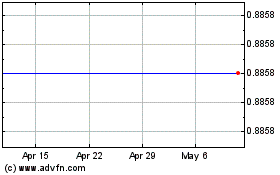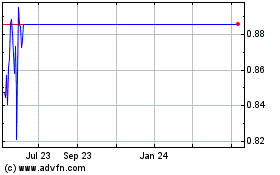Credit Suisse Pays Price for 16-Year-Old Misstep
February 04 2016 - 7:19PM
Dow Jones News
By Justin Baer and Michael Rapoport
Storied brokerage Donaldson, Lufkin & Jenrette hasn't
received much attention since being folded into Credit Suisse AG 16
years ago. But it resurfaced Thursday as an expensive footnote in a
dreary day for its Swiss parent.
Credit Suisse said it would take a write-down of about 3.8
billion Swiss francs ($3.8 billion) largely reflecting impairments
from its $11.5 billion acquisition of DLJ--a move that showed the
extent to which investment banking has soured as a business since
the turn-of-the-century merger.
The write-down, which helped push Credit Suisse shares sharply
lower Thursday, followed the bank's decision last fall to
restructure and shrink its investment-bank unit.
That upheaval triggered a reassessment of the goodwill value
that has remained on Credit Suisse's balance sheet from DLJ, whose
businesses long ago were integrated into the Swiss bank's.
Big European lenders are cutting back their trading activities
and retrenching globally due to slow growth at home and a sluggish
start to shore up their capital bases following the financial
crisis.
Credit Suisse said Thursday that net revenue fell 34% to 4.2
billion francs. The bank, run by CEO Tidjane Thiam, also said it
would cut about 4,000 jobs as part of an attempt to reduce costs by
billions of dollars.
The DLJ deal, sealed soon after the peak of the late-1990s
Internet bubble, was championed by Allen Wheat, then chairman of
Credit Suisse's investment-bank unit. The Swiss bank paid nearly
three times the U.S. firm's book value, a pricey deal even by the
standards of the dot-com-bubble era.
The acquisition brought Credit Suisse well-known bankers like
Hamilton James, now president of Blackstone Group, and deal maker
Ken Moelis, who now runs his own advisory firm. But it was a messy
marriage from the start.
The freewheeling, energetic upstart didn't mesh well within the
more buttoned-up, process-driven Credit Suisse First Boston, the
Swiss lender's investment-banking unit. "It like was a group of
people living on a tropical island," one former executive said of
DLJ. "And then the dream ended."
There also was a lot of overlap. Some of DLJ's key employees
left quickly. The economic downturn that followed accounting
scandals, the dot-com bust and the 2001 terrorist attacks took a
toll on the businesses that had been DLJ's strengths, including
lending to companies with low credit ratings.
Credit Suisse rebounded later in investment banking under CEO
Brady Dougan, a low-key trader whose risk-averse style helped the
firm during the 2008 financial crisis. But the bank stumbled in
recent years after tougher regulations on bond trading squeezed
profits for all banks.
Mr. Dougan exited last year and was replaced by Mr. Thiam, an
executive from insurer Prudential PLC who has proven less enamored
with investment banking.
Mr. Thiam quickly moved ahead with plans to raise capital and
cut business such as foreign-exchange trading, prompting the latest
write-downs.
When a company pays a premium in a deal, it is booked as
goodwill, an intangible asset that reflects the price paid beyond
that covering a target's hard assets like cash and real estate.
If the company later determines that the acquisition's
performance can no longer support that premium, it has to wipe out
the goodwill, even if it is a decade or more after the deal.
Across the investment bank, Credit Suisse said about 2.7 billion
francs, or 70% of the impairment, came from the trading businesses,
while the rest came from the Asia-Pacific unit and capital-markets
businesses such as underwriting and merger advisory.
Recent regulatory requirements have required Credit Suisse and
other banks to hold more capital, making it harder for investment
banks to generate profits, thus lowering the value of those
operations.
Goodwill-impairment charges can also be an implicit
acknowledgment that a company overpaid for an acquisition.
Credit Suisse isn't the first bank to write down the goodwill
tied to an old investment-bank acquisition long after the fact.
Last October, Deutsche Bank AG took a write-down of 5.8 billion
euros ($6.4 billion) that was partly tied to the Bankers Trust
business it bought in 1999 for $10 billion. The German bank
indicated at the time that the write-down was prompted in part by
new regulatory requirements.
(END) Dow Jones Newswires
February 04, 2016 19:04 ET (00:04 GMT)
Copyright (c) 2016 Dow Jones & Company, Inc.
Credit Suisse (NYSE:CS)
Historical Stock Chart
From Mar 2024 to Apr 2024

Credit Suisse (NYSE:CS)
Historical Stock Chart
From Apr 2023 to Apr 2024
